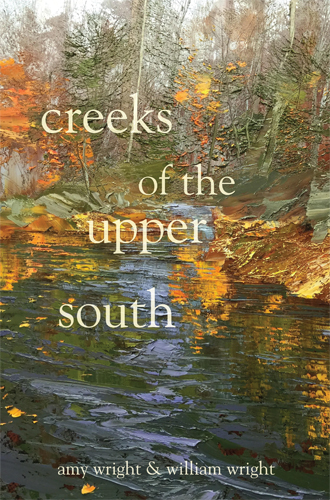Creeks of the Upper South. Amy Wright & William Wright. Jacar Press & Unicorn Press. Durham, North Carolina. 2016.

Collaborations in poetry can be damned hard work. Creeks of the Upper South is a call and response collaborative book of poems from Amy Wright and William Wright and it is seamless.
Today's book of poetry has attempted different types of collaborative poetry with mixed results. It's hard enough to find someone you agree with on anything let alone finding someone to share a page with. It is deep, murky water and there are dangers everywhere. All of that to say that Today's book of poetry marveled at the synchronicity in every danced step between Wright and Wright.
Memory and Prophecy
What She Remembers:
That in the summer of her seventh year,
storms slanted in and engorged the rivers
and creeks until all waters buckled high,
shattered the levies and bit to the quicks of berms:
houses that did not kneel and drift away moldered.
They moved the whole town eight miles north.
That in her ninth year she came back to the creek
then in drought and walked barefoot
the dry bed's limb-trash and alabaster--
That something in the slim sun-spears made
her look up into the unshackling of April
and witness a horse skeleton, brown-white
as the soles of her feet and silty hands.
She looked long at how vines twined its brisket,
at the strange philodendron head, drained
of flesh, brainless and almost comical in
its stillness, staid and smiling long with gothic
joy at the sheer oddness of how the Earth had reined it.
That the winter of her thirteenth year
in the frigid mineral-scent of dusk, the Harman
boy breathed warmth on the small hairs of her neck,
the whiskey on his child's breath, how they leaned
into one another in the blindness and purity
of the killed grass beside the creek, the water frozen
pure to the floor, where stunned curves
of minnows flashed tinny and motionless
under the stars' arc-light.
That the thaw snapped and pocked the air like gunshots
so that in the first hint of spring the Harman brother
slew the boy she kissed and dragged his kin down into the gorge.
What She Cannot Foresee:
That centuries the white window of the moon will open,
house roofs will crumble as the horse bones gripped
in the long-fallen oak will fall themselves, then grind
down with years, fold as dust and meld with the specks
kept there of the murdered boy, millennia-old, both
now in the earth proper, slack and laggard slow.
...
Now if that isn't gothic/romantic enough for you I'll eat my shorts. Wright/Wright take you down to the water to see if you'll float. They make you walk barefoot .through the millennial ooze, the silt of their ancestors. This is captivating stuff, you open the cover to this little gem and you are instantly under the spell cast by Wright/Wright.
Wright x2 have a biologist, historian, anthropologist, geologist and a bevy of scientists on their research team and along with their own gothic charm it makes for a riveting crossing of all this stormy water, the Wrights have roiled up the water and we are in for an emotional voyage. Their rich lingo sings of a particular notion of the South, I can see Carson McCullers and William Faulkner at the edge of one of these coulees, Flannery O'Conner is probably somewhere nearby.
Sanguinaria
In the chill before Easter, it was dusk again,
and my mother and I walked the berm, out past
the corn, The night's door warped: the sky
broken from its hinge swung down
low to us, low enough that the smell of rain
steeped our hair. Behind the springhouse,
we stopped to watch a possum crawl
over a years-old midden
with such reckless fear that she took a spade to its skull.
How can I justify a fear that blooms in the gut
and stings like thistle? Such creatures follow
me in my sleep, the ones harmless but foul,
the ones that must haunt: blowfly, centipede,
wolf spider, the bubbling muck of toads.
We trudged into watercress, across the field,
she in her country gown, a ghost before me--
down to the hemlocks and galax
when rain fell sudden, and the wind
pierced the thicket and drowned our scalps.
There is no such thing as empathy.
*
The storm drove through, just north
of us, a great spectral womb broken, ripped.
Our footfalls hugged the creekside's silence,
its washed-out susurrus, its sealed mouth.
There with her in that violet cold, all the blood
that ran through that shadow. All the bloodroot
we smashed through, the bloodwort, puccoon root,
into slanted fields two
farms over, up from the rushing creek curve
where heaped stones were draped with lichen.
The moon smeared behind clouds, a runnel
of milk. Why does the sight
of lanterns dawdling in a far pasture
ignite the heart with a joy and sorrow that, upon sleep,
the mind lumbers with false memories of farmhouses,
days and days of threshing grass, the chirr
and grind of crickets in the core of a summer long dead?
The rain fell hard: we quickened through briars, up
to the backdoor, the red light that framed it.
She said nothing. I witnessed her face
turning in the window--a shivering
leaf that withered, that would not release.
...
These poems have a cumulative effect on the sodden reader. Wright & Wright know their business and their business is to write emotionally haunting and visually stunning poems that get under your skin like a poetry tick.
Today's book of poetry has long admired the voice of Shelby Foote. Foote was a historian and novelist and he had a voice of such gravitas and humour, warmth and wit, that I could happily of sat and listened to him read a phone book. Shelby Foote reading Creeks of the Upper South is an entertainment I would pay almost anything for. He'd ride over these poems with the perfect verbal caress. These are poems that should be read aloud.
Understory
And now we will witness the unseen flames:
cardinal shit, apple maggots, fishbone thistle, squama
and fauna scales, keratinous flakes flecking ground;
sporiferous trees (ambassadorial as they kneel);
hyssop, sometimes odoriferous; dried blood on bard,
dropwort, smartweed and sweetleaf; outhouses
still standing in a crush of woods (redolent of peaches);
early-century crates breaking under the weight of wild squash;
crimson minnows courting a swale (painterly over chalk-white silt
and rocks stroked with moss so green it hurts to look);
woad and its micro-cache of bluest rivers; witloof chicory
(good in salads); distant farmhouse windows on winter nights
shining like citrine stricken with sun; the yucca's
blades curdled over with cream-flowers a few April days;
jars of milk; smells of leaf-fire; poxy bogs
emeralded with mosquito eggs; itchweed, abelia,
and spittlebugs with their soapy secretions;
the half-buried bones of horses, their skulls
ghastly and beautiful; musket balls buried (for good);
possum oak and possums themselves (drooling
and conspiratorial in suburban sheds);
ivory nuts and ivy-tods; the helix-lattices of lichen;
gypsum and hagberry; the toothless kin-gone elderly
who grin at the edges of cracked doors (kind or wary);
snakeskins, fraxinella (burning bush); understory
flames; diatomoceous earth; the waxy cartilaginous
bulbs or rocky shoal spider litlies; cutworms that gnaw
on vegetable seedlings so that they fall like small timbers;
capillary mattings (wicking water from reservoirs);
wild decay (never gothic) and wildest revival (never lofty).
...
Amy Wright and William Wright have done something remarkable. It is not just that they have become one voice for the purposes of Creeks of the Upper South, but that they have become a choir, in unison, with resolve.

Amy Wright

William Wright
ABOUT THE AUTHORS
Amy Wright has authored two poetry collections and five chapbooks. The Nonfiction Editor of Zone 3 Press, Coordinator of Creative Writing and Associate Professor at Austin Peay State University, she has been awarded a Peter Taylor Fellowship for the Kenyon Review Writers’ Workshop, an Individual Artist’s Fellowship from the Tennessee Arts Commission, and a fellowship to the Virginia Center for the Creative Arts. You may find some of her work online at: awrightawright.com.William Wright is author of four books of poetry, most recently Tree Heresies and Night Field Anecdote, as well as four chapbooks. He is editor of eleven editions, including all volumes ofThe Southern Poetry Anthology series (Texas Review Press), two texts centered on Gerard Manley Hopkins (Clemson University Press, forthcoming, 2016), and Hard Lines: Rough South Poetry (USC Press, forthcoming, 2016). He is assistant editor of Shenandoah.
BLURBS
“The poems in Creeks of the Upper South rely on call and response—both within individual poems and from poem to poem—which seems fitting, given the collaborative nature of the collection. At times, the voices and personal narratives are alive and burgeoning, and at the same time fragile. Other times, primal and colloquial language fuses into a lexicon of ecological anxieties and understandings. This collection calls us to take off our boots, roll up our britches, and follow the creeks and voices meandering and forking through these poems. We can’t help but respond.”
— Adam Vines
“Creeks of the Upper South is collaborative poetry at flood-surge. It is a braided stream, the skitter-flight of water-fowl, a storm event of vowels, childhood as rocky shoals, cutbank in language’s flow. Amy Wright and William Wright walk back the postmodern idea that word and place, signifier and signified, can’t roil the same deep channel.”
— John Lane
470
DISCLAIMERS
Poems cited here are assumed to be under copyright by the poet and/or publisher. They are shown here for publicity and review purposes. For any other kind of re-use of these poems, please contact the listed publishers for permission.
We here at TBOP are technically deficient and rely on our bashful Milo to fix everything. We received notice from Google that we were using "cookies"
and that for our readers in Europe there had to be notification of the use of those "cookies. Please be aware that TBOP may employ the use of some "cookies" (whatever they are) and you should take that into consideration.
No comments:
Post a Comment
Note: Only a member of this blog may post a comment.